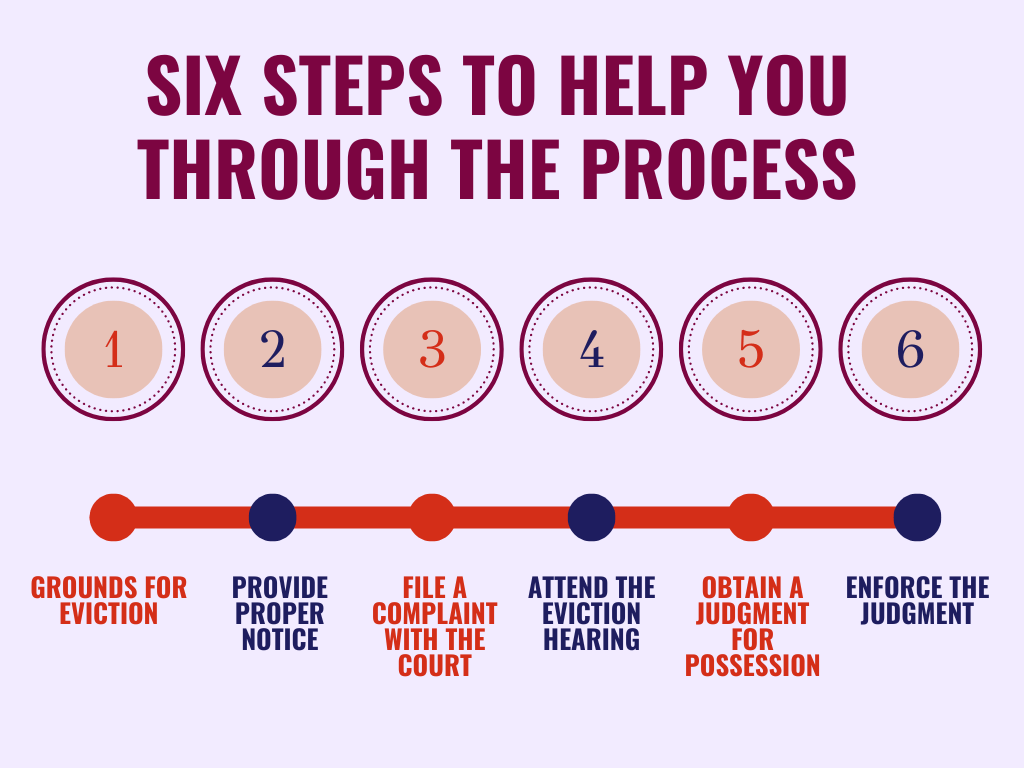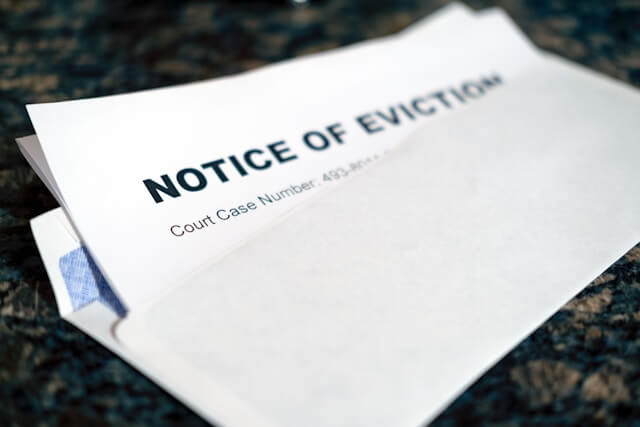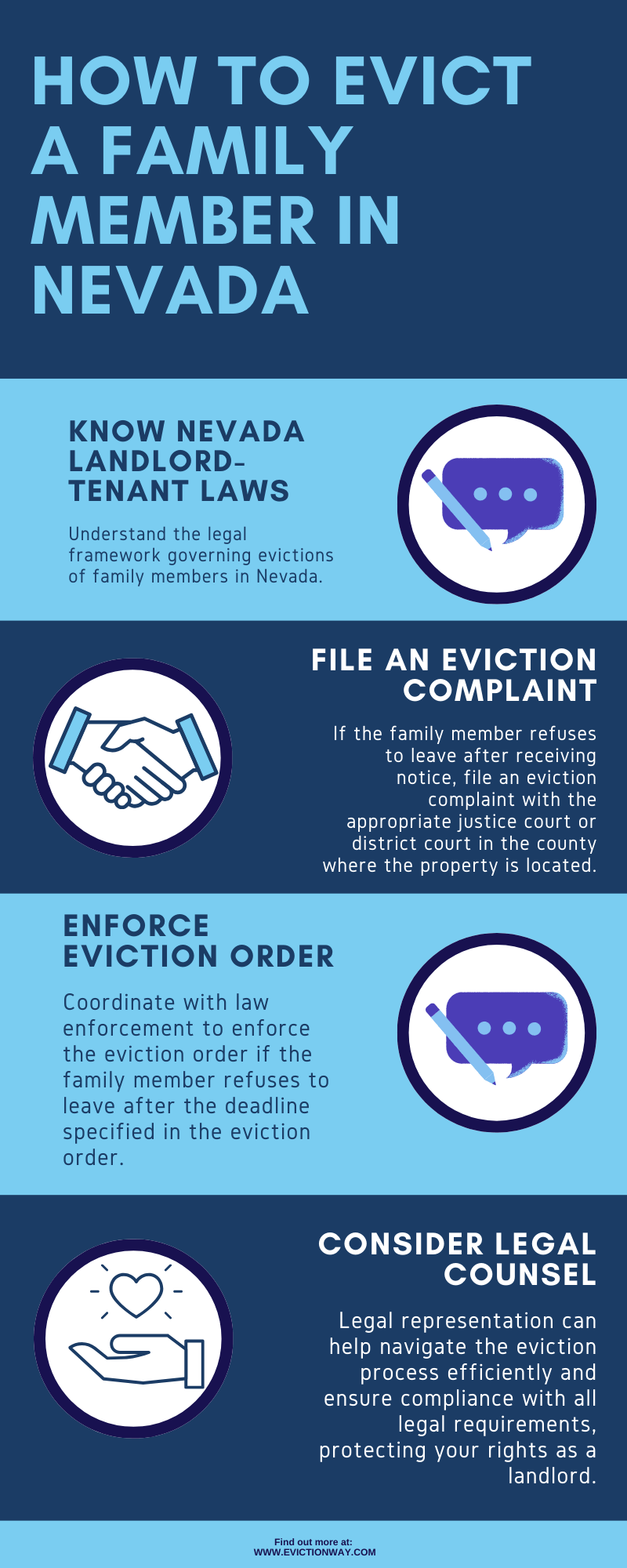Evicting a family member can be a difficult and emotional process, but it may be necessary to protect your rights and property. If you’re facing this situation in Nevada, this blog will guide you through the legal process and provide tips to help you navigate this challenging time.
We’ll start by outlining the legal steps involved in evicting a family member in Nevada. Also cover everything from serving a notice to quit to filing for eviction in court. We’ll provide tips on how to communicate your decision to your family member and how to minimize the emotional impact of the process.
Finally, we’ll share some legal tips to help you protect your rights. We’ll discuss the importance of having a written lease agreement, the rights of tenants and landlords, and the potential consequences of illegal evictions. By understanding the law and following the proper procedures, you can ensure that the eviction process is fair and legal.

How To Evict a Family Member In Nevada
Evicting a family member can be a difficult and emotional process, but it is sometimes necessary to protect your rights and property. If you are considering evicting a family member in Nevada, it is important to understand the legal process and your rights as a landlord.
1. Determine If You Have Grounds for Eviction
In Nevada, there are several grounds for eviction, including:
- Nonpayment of rent
- Breach of lease agreement
- Illegal activity
- Nuisance behavior
2. Provide Proper Notice
Once you have determined that you have grounds for eviction, you must provide the tenant with proper notice. The notice period will vary depending on the reason for eviction.

3. File a Complaint with the Court
If the tenant does not vacate the property after receiving the notice, you will need to file a complaint with the court. The complaint should state the grounds for eviction and request a judgment for possession of the property.
4. Attend the Eviction Hearing
Once the complaint has been filed, a hearing will be scheduled. At the hearing, you will have the opportunity to present your case to the judge. The tenant will also have the opportunity to present their case.
5. Obtain a Judgment for Possession
If the judge rules in your favor, you will be granted a judgment for possession of the property. This judgment will give you the legal right to evict the tenant.
6. Enforce the Judgment
Once you have obtained a judgment for possession, you can enforce the judgment by having the tenant removed from the property by a law enforcement officer.

Additional Resources for Nevada eviction help:
Eviction notice Nevada
In Nevada, when a tenant violates the terms of their lease, the landlord typically issues an eviction notice or a notice to quit. This document notifies the tenant of the breach and allows them a certain number of days to address the issue or move out.
It’s a crucial step in the eviction process and provides tenants with a final opportunity to resolve the issue before further legal action is taken.
You can download Eviction notice Nevada here.
How Much Does it Cost to Evict a Family Member in Nevada?
Evicting a family member can be a difficult and expensive process. In Nevada, the cost of eviction will vary depending on the specific circumstances of the case. However, there are some general costs that you can expect to incur.
| Expense Category | Estimated Cost ($) | Notes |
|---|---|---|
| Filing Fees | 71 – 150 | Varies by county and the type of eviction procedure. |
| Attorney Fees | 500 – 5,000+ | Highly variable; depends on the complexities of the case and the attorney’s rates. |
| Service of Process Fees | 25 – 100 | Fee for serving the eviction notice on the tenant. |
| Locksmith Fees | 75 – 160 | If changing the locks is necessary after eviction. |
| Storage Fees | Varies | If you need to store the evicted family member’s belongings; depends on volume and time. |
| Sheriff or Constable Fees | 50 – 150 | If law enforcement assistance is needed to carry out the eviction. |
| Additional Court Costs | Varies | If the matter is contested or requires additional court hearings. |
- Filing fees: The filing fee for an eviction case in Nevada is $150. This fee is non-refundable, even if your case is dismissed.
- Service of process: The cost of serving the eviction notice to the tenant will vary depending on the method of service.
- Attorney fees: If you hire an attorney to represent you in your eviction case, you will be responsible for their fees. Attorney fees can vary widely, so it is important to get a quote from an attorney before hiring them.
- Court costs: If your case goes to trial, you will be responsible for court costs. Court costs can include the cost of the bailiff, the court reporter, and other expenses.
FAQs: Evicting a Family Member in Nevada
Here are some of the most frequently asked questions about evicting a family member in Nevada:
What is the legal process for evicting a family member in Nevada?
To evict a family member in Nevada, you must first give them a written notice to vacate the property. The notice must state the reason for the eviction and the date by which the family member must leave. If the family member does not leave by the specified date, you can file a complaint with the court.
The court will then hold a hearing to determine whether the eviction is justified. If the court finds that the eviction is justified, it will issue an order requiring the family member to leave the property.
What are the grounds for evicting a family member in Nevada?
There are several grounds for evicting a family member in Nevada, including:
- Nonpayment of rent
- Violation of the lease agreement
- Causing damage to the property
- Engaging in criminal activity
- Threatening or harassing other tenants
Can I evict a family member if they are not on the lease?
Yes, you can evict a family member even if they are not on the lease. However, you must still provide them with a written notice to vacate the property and file a complaint with the court if they do not leave by the specified date.
How long does an eviction stay on your record in Nevada?
In Nevada, an eviction stays on your record for seven years from the original delinquency date.
How long is the eviction process in Nevada?
The eviction process in Nevada can take anywhere from 10 to 180 days, depending on the specific circumstances and court proceedings.
What is an illegal eviction in Nevada?
In Nevada, an illegal eviction is when a landlord removes a tenant from their property without following the proper legal procedures, such as providing proper notice and going through the court system.
What are the consequences of illegally evicting a family member in Nevada?
Illegally evicting a family member in Nevada can have serious consequences, including:
- Fines
- Jail time
- Damages
Can I get help with evicting a family member in Nevada?
Yes, there are several resources available to help you with evicting a family member in Nevada, including:
- Legal aid organizations
- Tenant advocacy groups
- The Nevada Attorney General’s Office
Related:
How to Evict a Family Member in Wyoming
